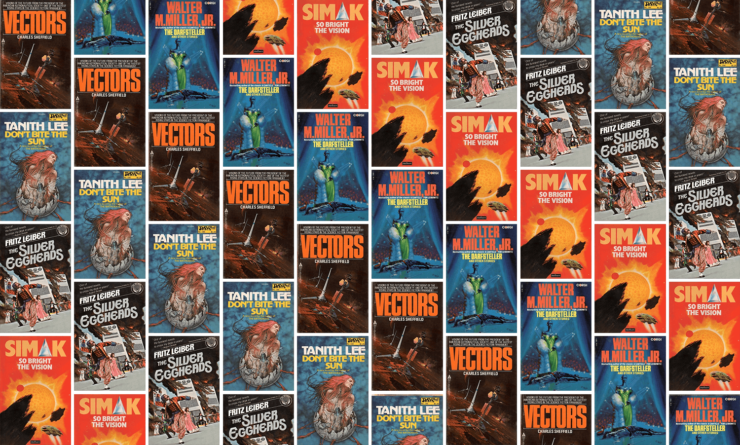Anxiety over mechanization-driven job loss dates back at least as far as the early days of the industrial revolution. Adding computers to humanity’s tool kit has only exacerbated such concerns. Bad enough that machines could replace muscle power and nimble fingers—if computers could replace essential elements of human cognition as well, what is left for humans to do?
No activity is quite so human as art. Therefore, early computer-age authors looking for particularly poignant examples of mere humans being shoved aside by superior automation might well imagine that art, too, has been automated. And so they did, as these examples show.
“The Darfsteller” by Walter M. Miller (1955)
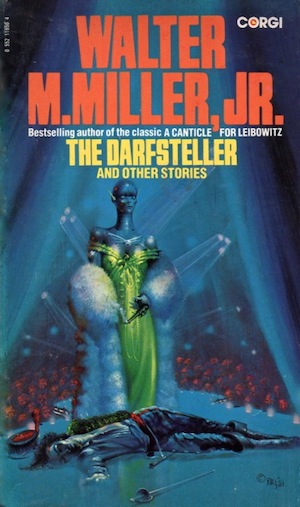
Thanks to advances in the field of robotic acting, Ryan Thornier, former star, is now Ryan Thornier, underpaid theatre janitor. True, there are many occupations not yet automated to which the old man could apply his thespian talents—salesman, politician, general—but these are beneath the former star. Only stage acting will do. But his desire to shine onstage cannot erase the fact that robotic mannikins programmed with recorded personality matrices deliver the same services as living actors, but are much cheaper and more reliable.
Ryan is very stubborn. Given even the smallest hope of reclaiming his lost place on stage, he will leap to take advantage of the opportunity…regardless of consequences.
***
“So Bright the Vision” by Clifford D. Simak (1956)
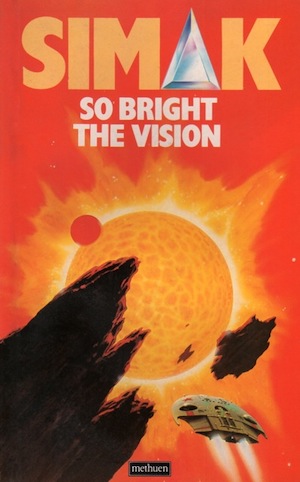
Earth has one resource no alien world can match, which is the human gift for outrageous, entertaining falsehood. Determined to fill the galactic demand for fiction, Earth maximized output by automating writing. Powerful word engines grind out story after story, thus ensuring Earth’s economic well-being.
What’s good for Earth can be mighty hard on the individual. Kemp Hart, for example, cannot afford to keep up with advances in writing machinery. His composing device is old-fashioned. Consequently, so is Hart’s output. Because his work is subpar, Hart cannot afford the cutting-edge machine that might lift him out of poverty. A man trapped in poverty can be forced to unthinkable extremes. Too bad that Kemp Hart can’t resist temptation.
***
The Silver Eggheads by Fritz Leiber (1962)
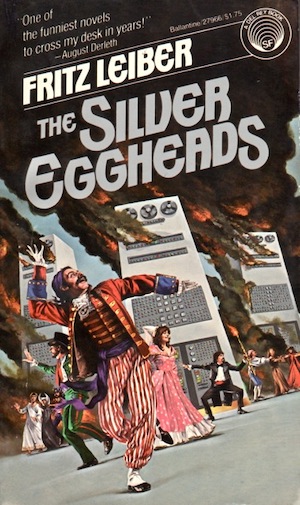
Comfortably ensconced within lurid covers enhanced with sound, moving pictures, embossing and textures—covers of which today’s publishers can only dream—the novels of tomorrow deliver to avid readers fiction perfectly suited to the reader’s tastes. How could they not? Every work is composed by wordmills, flawless fiction-generating mechanisms.
There is one tiny flaw in this utopia, which is that though they are obsolete, human writers persist. Despite featherbedding rules that give them sinecures as pointless assistants to the wordmills, writers dream of writing fiction themselves. It’s no surprise when the frustrated writers rise up and smash the wordmills. Now humans will dominate literature once more!
If only any of the rebellious writers had even the smallest inkling of how to actually write…
***
“What Song the Sirens Sang” by Charles Sheffield (1977)
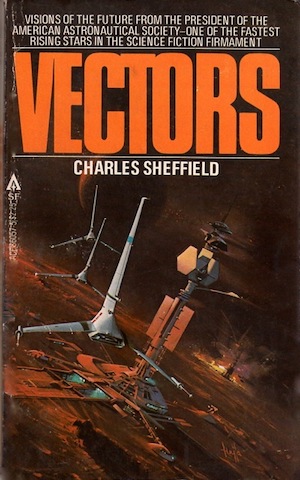
James Webster seems an unlikely demagogue, but he’s achieved a surprisingly successful political career. Veteran reporter Bill Forrest decides to take a close look at Webster. Result: consternation. Webster’s words and delivery are utterly banal, and yet the man is adored. How? Why?
Forrest discovers that Webster wields tools that make inspiration, talent, and hard work irrelevant. Whatever he says, however bland and uninspired, is irresistible. Now Forrest wonders if Webster will make human art irrelevant.
***
Don’t Bite the Sun by Tanith Lee (1976)
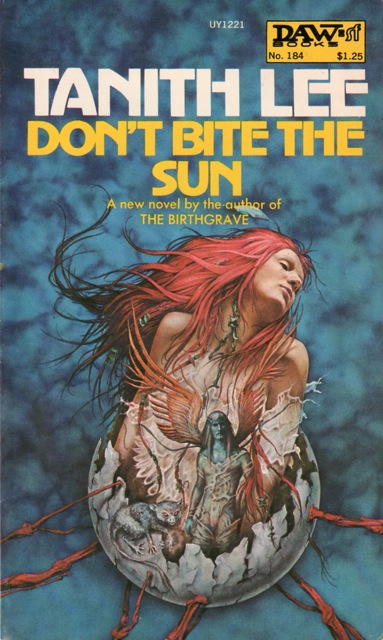
The three domed cities—Four-BAA, Four-BEE, and Four-BOO—offer their human inhabitants every experience, every bauble they might desire. Famine is unknown, appearance and gender may be altered according to personal preference, and life itself may be sustained indefinitely. Childhood is followed by socially mandated youthful debauchery, which is followed in turn by a life of staid tranquility that can be sustained for centuries… or even longer. Maintaining civilization is left to the quasi-robots.
The unnamed narrator discovers that this life does not satisfy. They do not care to fill the centuries with empty passion, boring self-indulgence, or tedious orgies. Therefore, they set out in quest of some activity that will provide meaning to their lives. It’s clear that the jobs that Older People do are pointless sinecures. Artistic expression appears to offer potential fulfillment…or it would, if the quasi-robots hadn’t automated art as well. (And if they didn’t do it better than mere humans.)
Having been denied any hope of meaningful self-expression within their cities, it is no surprise the protagonist begins to consider the wastelands outside the domed city. Here they encounter a significant impediment. The quasi-robots are willing to provide their charges with almost anything they might desire…but not freedom.
***
Perhaps other examples come to mind. (More works by women than I managed?). If so, the comments are below.
In the words of Wikipedia editor TexasAndroid, prolific book reviewer and perennial Darwin Award nominee James Davis Nicoll is of “questionable notability.” His work has appeared in Publishers Weekly and Romantic Times as well as on his own websites, James Nicoll Reviews and the Aurora finalist Young People Read Old SFF (where he is assisted by editor Karen Lofstrom and web person Adrienne L. Travis). He is a four-time finalist for the Best Fan Writer Hugo Award and is surprisingly flammable.










